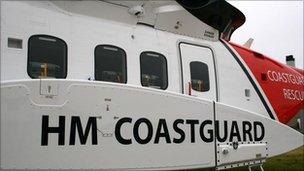Minister unveils revised cuts to UK coastguard centres
- Published

The government says its proposals will modernise the service
Several UK coastguard centres previously earmarked for closure have been given a reprieve - but eight will still go, with a loss of 159 jobs.
Both Shetland and Stornoway will remain in operation - a change to original plans which would have seen one shut.
Clyde, Swansea and Liverpool will be among those centres to close.
Shipping Minister Mike Penning said he knew there would be "disappointment", but the changes were necessary to create a 21st Century service.
The government originally wanted to cut the number of 24-hour coastguard centres from 18 to three but, following an outcry, agreed to look again at the plans.
At present, the 18 operate in nine pairs covering overlapping geographical areas.
Under the revised plans, at least one of each pair will be retained, and in the case of Stornoway and Shetland, both will remain open.
'Limited resilience'
The co-ordination centres at Forth, Clyde, Great Yarmouth, Liverpool, Thames, Swansea, Brixham and Portland will close by March 2015 - although some limited functions, such as radio masts, will remain at Liverpool, Swansea and Thames.
The centre at Solent will be replaced by the new Maritime Operations Centre (MOC) in Fareham, in Hampshire, which will be housed in the vacant Fire Control Centre building.
An unmanned back-up MOC will be established at the existing Dover centre and both this and Fareham will operate on a 24-hour basis.
Centres at Falmouth, Milford Haven, Holyhead, Belfast, Stornoway, Shetland, Aberdeen and Humber will be retained, as will the smaller London facility that manages the tidal Thames.
The government says the current system comprises "dispersed centres with no network of national integration" and therefore has "very limited resilience in the event of high demand or technical problems".
Mr Penning told the Commons: "I understand, of course, that the closure of some existing co-ordination centres and the loss of some coastguard jobs will come as a disappointment to those directly affected.
"However, the decisions I have announced today will deliver the modernised, nationally networked, fully resilient coastguard service we require for the future while reducing costs."
The move would give "better support for our coastguard volunteers" and "front-line rescue capabilities", he added.
Earlier plans had favoured the creation of two MOCs, one in Aberdeen - a centre for the North Sea oil and gas industries - and the Portsmouth-Southampton area.
But Mr Penning said the government had decided that one, in Fareham, would be "sufficient" - albeit it with the unmanned backup in Dover.
Shadow shipping minister Jim Fitzpatrick said he had "no doubt" the proposals were "at least partly driven by financial constraints".
"In a number of communities out there now there will be real disappointment and even anger today," he added.
'Totally irresponsible'
The Scottish National Party accused ministers of putting lives at risk by closing two out of five stations in Scotland.
West of Scotland MSP Stuart McMillan said: "Closing Clyde is reckless and misguided and shows the UK government continues to miss the point of local coastguard services."
"Clyde's waters see 10 million tonnes of cargo annually and have no less than 27 marinas. It is one of the busiest areas in the UK for ferry travel with 8.5 million passengers a year and the base for the UK's nuclear submarines. These cuts are totally irresponsible."
First Minister of Wales Carwyn Jones said in a statement he was "very dismayed" that the government ignored campaigns to save the Swansea centre.
"One of the UK government's rationales for closing the Swansea coastguard station - Wales' busiest and the third busiest in the UK - is that the Department of Transport already employ large numbers of people in the city at the DVLA. This unacceptable.
"DVLA staff are a completely separate issue and have no influence on safeguarding our coastline. It is clear the UK government has paid no regard to the safety of the many thousands of people who visit and use our coastline for business and pleasure."
General secretary of the Public and Commercial Services union Mark Serwotka said: "Coastguards, the communities they serve and the wider public spoke with one voice in opposing these dangerous plans, but they have been shamefully ignored.
"We are seriously concerned that ministers want to press ahead with proposals that will mean the loss of vital local knowledge of our coastlines, and we are committed to keeping up the fight to defend our communities from these cuts."
- Published27 January 2011
- Published4 March 2011
- Published3 March 2011
- Published8 February 2011
- Published16 December 2010